Antonio J. Fernández-Leiva
Epoch-based Application of Problem-Aware Operators in a Multiobjective Memetic Algorithm for Portfolio Optimization
Dec 05, 2024Abstract:We consider the issue of intensification/diversification balance in the context of a memetic algorithm for the multiobjective optimization of investment portfolios with cardinality constraints. We approach this issue in this work by considering the selective application of knowledge-augmented operators (local search and a memory of elite solutions) based on the search epoch in which the algorithm finds itself, hence alternating between unbiased search (guided uniquely by the built-in search mechanics of the algorithm) and focused search (intensified by the use of the problem-aware operators). These operators exploit Sharpe index (a measure of the relationship between return and risk) as a source of problem knowledge. We have conducted a sensibility analysis to determine in which phases of the search the application of these operators leads to better results. Our findings indicate that the resulting algorithm is quite robust in terms of parameterization from the point of view of this problem-specific indicator. Furthermore, it is shown that not only can other non-memetic counterparts be outperformed, but that there is a range of parameters in which the MA is also competitive when not better in terms of standard multiobjective performance indicators.
* 13 pages, 2 figures
Metaheuristics for the Template Design Problem: Encoding, Symmetry and Hybridisation
Nov 05, 2024Abstract:The template design problem (TDP) is a hard combinatorial problem with a high number of symmetries which makes solving it more complicated. A number of techniques have been proposed in the literature to optimise its resolution, ranging from complete methods to stochastic ones. However, although metaheuristics are considered efficient methods that can find enough-quality solutions at a reasonable computational cost, these techniques have not proven to be truly efficient enough to deal with this problem. This paper explores and analyses a wide range of metaheuristics to tackle the problem with the aim of assessing their suitability for finding template designs. We tackle the problem using a wide set of metaheuristics whose implementation is guided by a number of issues such as problem formulation, solution encoding, the symmetrical nature of the problem, and distinct forms of hybridisation. For the TDP, we also propose a slot-based alternative problem formulation (distinct to other slot-based proposals), which represents another option other than the classical variation-based formulation of the problem. An empirical analysis, assessing the performance of all the metaheuristics (i.e., basic, integrative and collaborative algorithms working on different search spaces and with/without symmetry breaking) shows that some of our proposals can be considered the state-of-the-art when they are applied to specific problem instances.
Memetic collaborative approaches for finding balanced incomplete block designs
Nov 04, 2024
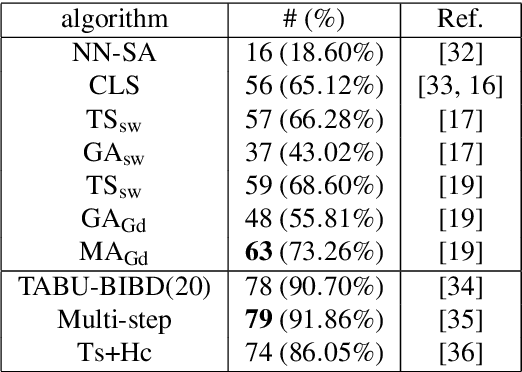
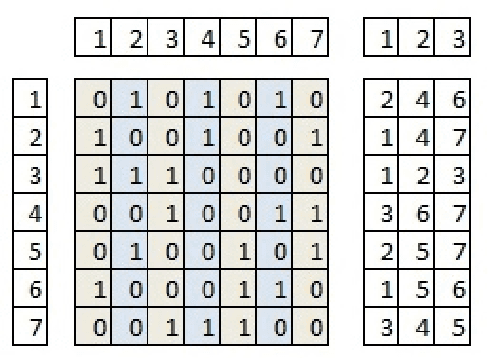
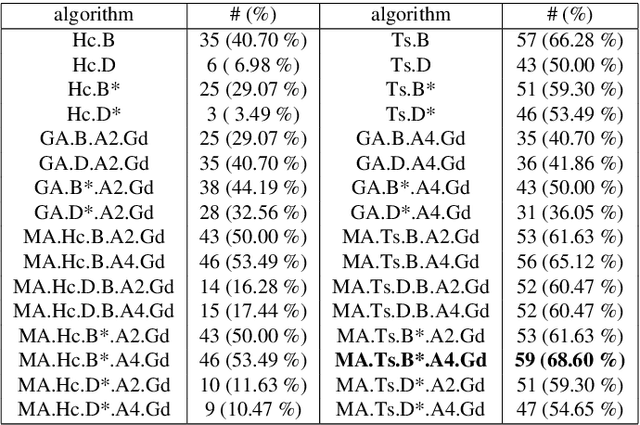
Abstract:The balanced incomplete block design (BIBD) problem is a difficult combinatorial problem with a large number of symmetries, which add complexity to its resolution. In this paper, we propose a dual (integer) problem representation that serves as an alternative to the classical binary formulation of the problem. We attack this problem incrementally: firstly, we propose basic algorithms (i.e. local search techniques and genetic algorithms) intended to work separately on the two different search spaces (i.e. binary and integer); secondly, we propose two hybrid schemes: an integrative approach (i.e. a memetic algorithm) and a collaborative model in which the previous methods work in parallel, occasionally exchanging information. Three distinct two-dimensional structures are proposed as communication topology among the algorithms involved in the collaborative model, as well as a number of migration and acceptance criteria for sending and receiving data. An empirical analysis comparing a large number of instances of our schemes (with algorithms possibly working on different search spaces and with/without symmetry breaking methods) shows that some of these algorithms can be considered the state of the art of the metaheuristic methods applied to finding BIBDs. Moreover, our cooperative proposal is a general scheme from which distinct algorithmic variants can be instantiated to handle symmetrical optimisation problems. For this reason, we have also analysed its key parameters, thereby providing general guidelines for the design of efficient/robust cooperative algorithms devised from our proposal.
* 16 pages, 7 figures
Deep memetic models for combinatorial optimization problems: application to the tool switching problem
Nov 04, 2024Abstract:Memetic algorithms are techniques that orchestrate the interplay between population-based and trajectory-based algorithmic components. In particular, some memetic models can be regarded under this broad interpretation as a group of autonomous basic optimization algorithms that interact among them in a cooperative way in order to deal with a specific optimization problem, aiming to obtain better results than the algorithms that constitute it separately. Going one step beyond this traditional view of cooperative optimization algorithms, this work tackles deep meta-cooperation, namely the use of cooperative optimization algorithms in which some components can in turn be cooperative methods themselves, thus exhibiting a deep algorithmic architecture. The objective of this paper is to demonstrate that such models can be considered as an efficient alternative to other traditional forms of cooperative algorithms. To validate this claim, different structural parameters, such as the communication topology between the agents, or the parameter that influences the depth of the cooperative effort (the depth of meta-cooperation), have been analyzed. To do this, a comparison with the state-of-the-art cooperative methods to solve a specific combinatorial problem, the Tool Switching Problem, has been performed. Results show that deep models are effective to solve this problem, outperforming metaheuristics proposed in the literature.
* 32 pages, 5 figures
Optimizing Hearthstone Agents using an Evolutionary Algorithm
Oct 25, 2024



Abstract:Digital collectible card games are not only a growing part of the video game industry, but also an interesting research area for the field of computational intelligence. This game genre allows researchers to deal with hidden information, uncertainty and planning, among other aspects. This paper proposes the use of evolutionary algorithms (EAs) to develop agents who play a card game, Hearthstone, by optimizing a data-driven decision-making mechanism that takes into account all the elements currently in play. Agents feature self-learning by means of a competitive coevolutionary training approach, whereby no external sparring element defined by the user is required for the optimization process. One of the agents developed through the proposed approach was runner-up (best 6%) in an international Hearthstone Artificial Intelligence (AI) competition. Our proposal performed remarkably well, even when it faced state-of-the-art techniques that attempted to take into account future game states, such as Monte-Carlo Tree search. This outcome shows how evolutionary computation could represent a considerable advantage in developing AIs for collectible card games such as Hearthstone.
* 43 pages, 11 figures
Evolutionary Computation in Astronomy and Astrophysics: A Review
Apr 10, 2012
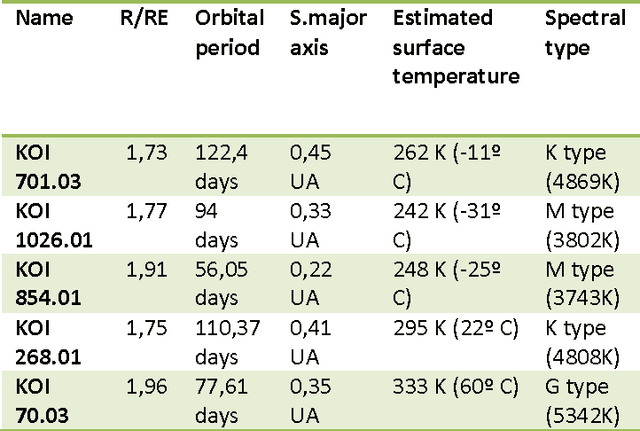


Abstract:In general Evolutionary Computation (EC) includes a number of optimization methods inspired by biological mechanisms of evolution. The methods catalogued in this area use the Darwinian principles of life evolution to produce algorithms that returns high quality solutions to hard-to-solve optimization problems. The main strength of EC is precisely that they provide good solutions even if the computational resources (e.g., running time) are limited. Astronomy and Astrophysics are two fields that often require optimizing problems of high complexity or analyzing a huge amount of data and the so-called complete optimization methods are inherently limited by the size of the problem/data. For instance, reliable analysis of large amounts of data is central to modern astrophysics and astronomical sciences in general. EC techniques perform well where other optimization methods are inherently limited (as complete methods applied to NP-hard problems), and in the last ten years, numerous proposals have come up that apply with greater or lesser success methodologies of evolutional computation to common engineering problems. Some of these problems, such as the estimation of non-lineal parameters, the development of automatic learning techniques, the implementation of control systems, or the resolution of multi-objective optimization problems, have had (and have) a special repercussion in the fields. For these reasons EC emerges as a feasible alternative for traditional methods. In this paper, we discuss some promising applications in this direction and a number of recent works in this area; the paper also includes a general description of EC to provide a global perspective to the reader and gives some guidelines of application of EC techniques for future research
Design of Emergent and Adaptive Virtual Players in a War RTS Game
Jan 15, 2012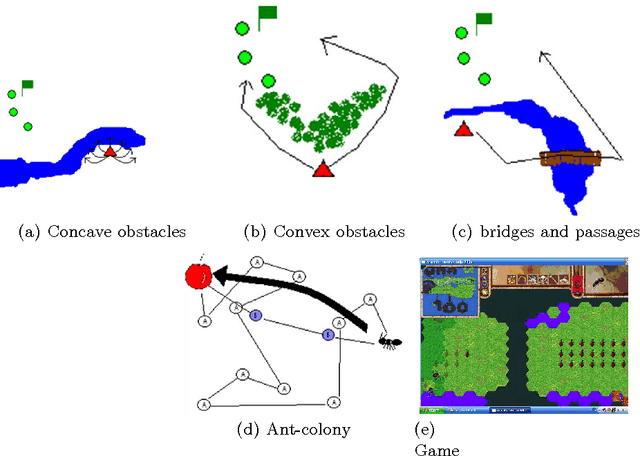

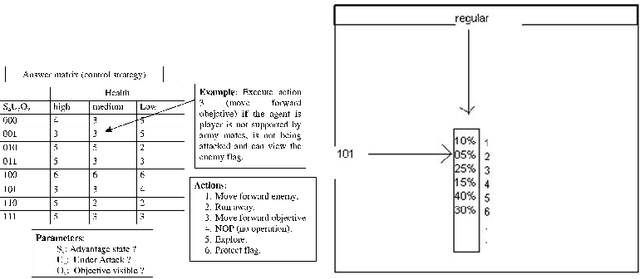
Abstract:Basically, in (one-player) war Real Time Strategy (wRTS) games a human player controls, in real time, an army consisting of a number of soldiers and her aim is to destroy the opponent's assets where the opponent is a virtual (i.e., non-human player controlled) player that usually consists of a pre-programmed decision-making script. These scripts have usually associated some well-known problems (e.g., predictability, non-rationality, repetitive behaviors, and sensation of artificial stupidity among others). This paper describes a method for the automatic generation of virtual players that adapt to the player skills; this is done by building initially a model of the player behavior in real time during the game, and further evolving the virtual player via this model in-between two games. The paper also shows preliminary results obtained on a one player wRTS game constructed specifically for experimentation.
 Add to Chrome
Add to Chrome Add to Firefox
Add to Firefox Add to Edge
Add to Edge